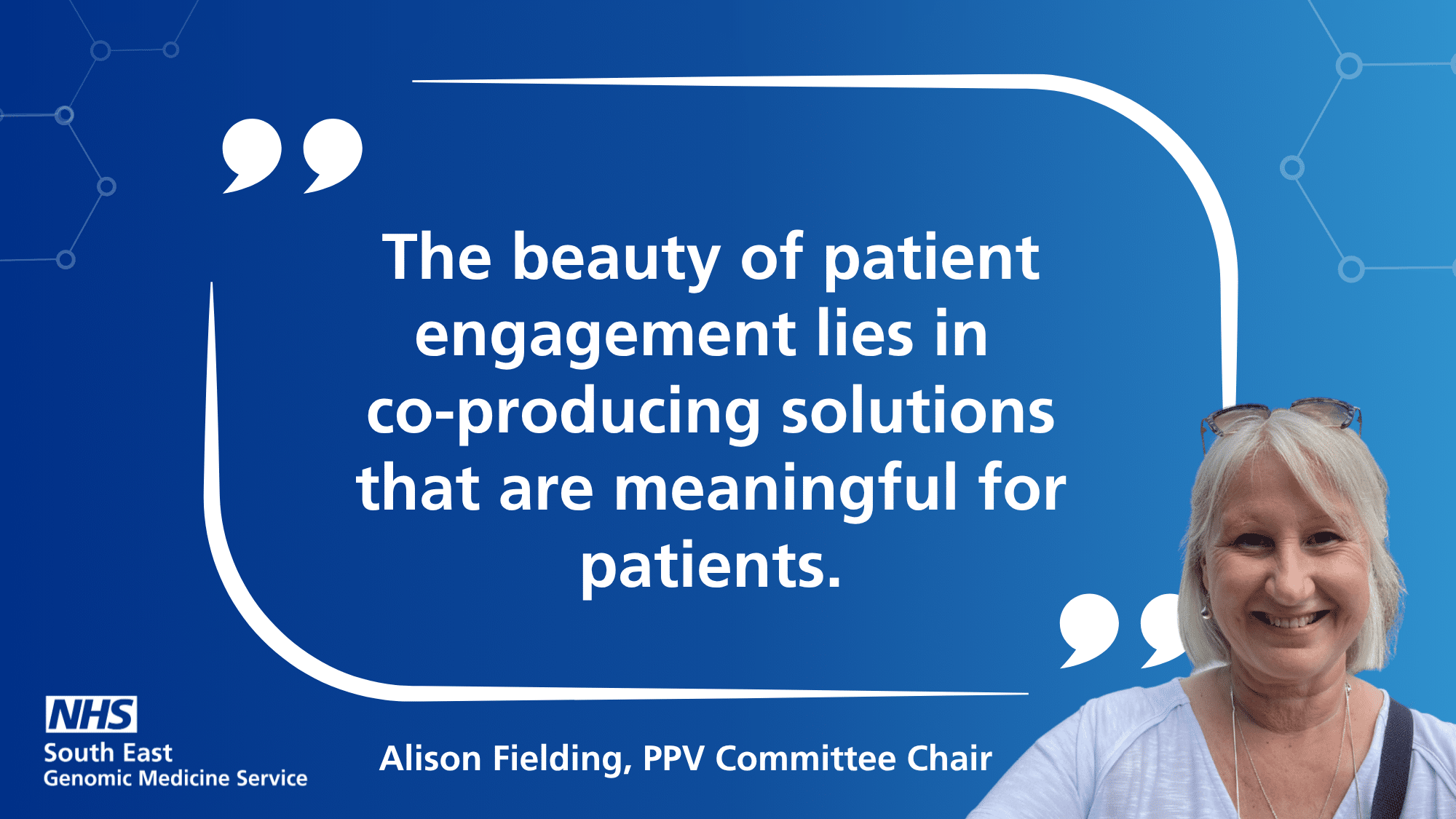Meet Alison, Chair of our People & Communities Committee

Alison Fielding is a Cardiomyopathy UK Change Maker and the Chair of the People & Communities Committee at the South East Genomic Medicine Service.
We spoke to Alison about her role as a Patient Representative and how she has found meaning through her work. She shared with us why it’s so important to connect with people who have real life experience of genomic medicine and inherited conditions.
How did you get involved with the Genomic Medicine Service?
I have cardiomyopathy which is a type of heart condition that can be passed down through the family. Since my diagnosis, I’ve been interested in genetics and genomics. In my extended family we have relatives affected by Cystic Fibrosis and Marfan Syndrome.
I saw the ad to join the Committee online and decided to apply. I was looking for something that was both intellectually stimulating and strategic, and where I could make a difference to the future of the organisation.
What does the People & Communities Committee do?
We work with the scientists and healthcare professionals to continuously improve the genomic medicine service. We do that in so many ways.
We actively connect with charities to ensure they (and therefore their members) know the latest information about genomic medicine. We recently organised an educational event for cardiac charities for example. We also proactively reach out to people, patients and charities to hear their experience of accessing genetic testing in the NHS. Their feedback helps us to ensure anyone who is eligible for testing can get it when they need it most.
As a group, we act as a sounding board for our genomic colleagues to test out ideas and help inform strategies. As patient representatives, we are also equal members within projects and workstreams.
‘Great power lies in working with patients who are able to build connections within communities.’
Other recent examples to highlight would be our regular Open Door sessions. We invite charities and individuals to visit our genetic testing laboratories to see for themselves how their testing was done. They have the chance to meet the scientists and ask all their questions. Equally they share their own personal experience of testing which helps lab colleagues to understand what needs to be improved. These have been very successful for everyone involved, and we ask attendees to share their new knowledge to build awareness.
‘The panel is made up of individuals who have had some experience of genetic testing in their family, and their networks allow them to reach other patient groups, charities and voluntary sector organisations.’
The Committee meets every 2 months, but we’re all also involved in activities in between.
‘The team we’ve put together is very special.’
Emma Jenkins, one of our patient advocates, helped author a report as part of the South East Regional Lynch Syndrome Transformation Project. That collaboration was shortlisted as a finalist at the prestigious 2025 HSJ Awards as the ‘Collaboration of the Year’. Her work, together with the team, was also recognised by the judges as a finalist for this year’s Picker Patient Experience Network Awards.
What have you gained from the experience and what does ‘Creating Connections in Genomics’ mean to you?
The thing you get from all voluntary jobs is that sense of motivation and inspiration from getting up and engaging with others over something you care about.
‘You can’t personalise care without connecting with patients and listening to what patients care about. Forming connections gives you a better understanding of what people’s needs are.’
Our group is happy to get involved in a wide range of activities and discussions.
But there’s nothing worse than when someone comes to a patient group at the end of a project and says, ‘Look what we’ve done, what do you think?’
Good patient involvement is being involved from the very start. It’s about being part of the discussions to shape the thinking and direction of a project. For some organisations that can require changing the culture from thinking solely of patients as service users rather than active participants in their own care. This can take time, but the beauty of it lies in co-producing health solutions that are meaningful to patients. We’re proud to have achieved that within the South East Genomic Medicine Service where patient representatives are integral to the way it works.

What advice would you give to healthcare professionals and researchers on their genomics journey?
‘It’s not all about data that is easy to categorise. People’s stories and experiences can cut through all of that and help make connections between things that help services run better for patients.’
Don’t overlook the value of patient organisations and charities. There is nearly always a specific organisation you can signpost your patients to, who can be there when you are not. They can offer practical support and information to patients and their families. They are not there to replace medical information but can provide plenty of emotional support and advice.
What’s next for you and the Committee?
Ensuring that the service which is provided is equitable and appropriate for our community is one of our key priorities for the future. Our aim is to do that by having more conversations directly with people and communities across our region and to ensure that the service responds to any findings in a positive and timely manner.
Have you, or someone you care for, undergone genetic testing in the last three years? Do you live in, or receive care in, South London, Kent, Surrey or Sussex?
Then please consider putting in an expression of interest to join our People & Communities Committee or join our mailing list for regular public and patient information and consultation opportunities.